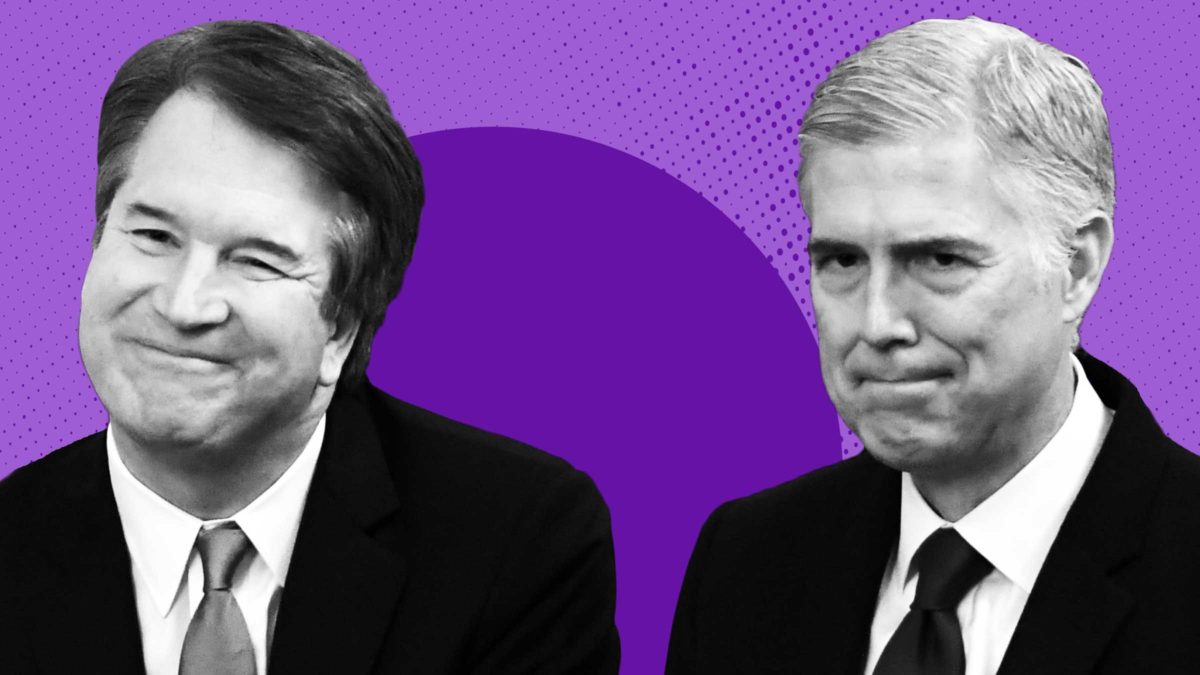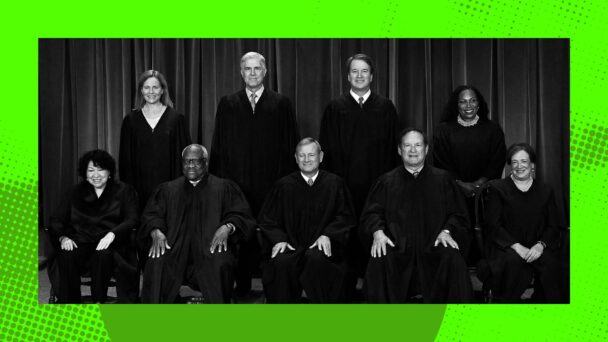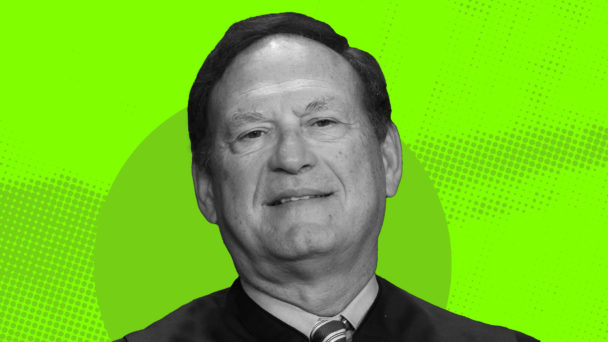In 2019, Democratic presidential hopefuls Bernie Sanders and Elizabeth Warren each unveiled versions of a wealth tax, which are, as the name suggests, taxes on the wealth of America’s ultra-millionaires and billionaires. Warren’s proposal, for example, would impose a 2 percent tax on every dollar of household net worth beyond $50 million, and an additional 4 percent on anything above $1 billion. This tax would only affect about 75,000 families, but would bring in about $3.75 trillion over a ten-year period—revenue that lawmakers could use to fund Medicare for All, a Green New Deal, or any of the other big-ticket ideas designed to prevent the America from becoming even more of a regressive oligopoly than it already is.
Because modest resource transfers from rich people who want for nothing to working people barely scraping by are the scariest thing your average Republican politician can fathom, the conservative legal movement hatched a plan. Moore v. United States, which the Supreme Court decided Thursday, is ostensibly a challenge to an obscure one-time tax on previously-untaxed foreign earnings, which Republicans passed in 2017 as part of President Donald Trump’s tax reform legislation. But the lawyers at the Competitive Enterprise Institute, the pro-corporate think tank that concocted the case, were not shy about what they really wanted the Court’s conservative supermajority to do: preempt hypothetical future Congresses from passing hypothetical future wealth taxes that could pass constitutional muster.
A decision in their favor, the CEI lawyers wrote in their briefing, would not only rescue the Moores, a well-to-do couple from Washington state, from a manifestly unjust $14,729 tax bill; it would also “effectively” rule Sanders- and Warren-style wealth taxes “out-of-bounds” once and for all. In light of the “many prominent proposals” for wealth taxes circulating in Washington, they concluded, “the Court’s guidance in this area is sorely needed.”
The good news for anyone who aspires to live in a safer and more equitable country is that the opinion in Moore, written by Justice Brett Kavanaugh, does not do everything the gremlins on the Wall Street Journal editorial board asked. The bad news is that the conservative justices used Moore to make abundantly clear—not only in the majority opinion, but also in a narrow concurrence from Justices Amy Coney Barrett and Samuel Alito, and a dissent from Justices Clarence Thomas and Neil Gorsuch—that they are reserving the right to outlaw wealth taxes for another day. Moore does not pave the way for Democratic lawmakers to one day pass a wealth tax; it warns Democratic lawmakers that they’d be wasting their time even trying it.
Most of Kavanaugh’s opinion, which was joined in substance by Chief Justice John Roberts and the three liberals, is focused on the nitty-gritty of the 2017 tax that is nominally at issue here. The Moores had argued that under the Sixteenth Amendment, in order for income to be taxable, it must be “realized”—basically, it must have taken the form of money, which one can use to pay a tax associated with it. Because many sources of wealth—stock holdings, to take just one example—haven’t actually been paid out in cash, this argument, if accepted by the Court, would dramatically limit Congress’s ability to tax wealth going forward.
The Moore majority, however, sidestepped the question altogether. Instead, it pointed to a long line of cases in which the Court has allowed Congress to tax shareholders or partners on the income of a business, regardless of whether dividends or distributions had actually hit the shareholders’ or partners’ bank accounts. This “long settled and established practice,” Kavanaugh concludes, carries “great weight in resolving constitutional questions,” and is enough to resolve this case without going any further.
The far more significant portion of the opinion, however, comes in the final section, when Kavanaugh deploys every little turn of phrase his brain can come up with to signal that, notwithstanding the result in Moore, he remains extremely open to striking down a wealth tax in the future. “We emphasize that our holding today is narrow,” he writes; in an ominous footnote, as if to dispel any ambiguity, he clarifies that the Court’s conclusion “does not address” Congress’s ability to impose “taxes on holdings, wealth, or net worth.” Those, he says, “are potential issues for another day.” In other words, if you are a Competitive Enterprise Institute lawyer seeking to make your corporate overlords happy, there is a lot to like in this opinion, even if the Court didn’t deliver the sweeping bottom-line conclusion for which you hoped.

(Photo by Jabin Botsford/The Washington Post via Getty Images)
Barrett’s concurrence, which Alito joined, is even less subtle. They are happy to answer the question the majority does not: Under the Sixteenth Amendment, she declares, realization of income is necessary before Congress can tax it. (One of the Moores’ lawyers, David Rivkin, moonlights as a legal pundit who wrote a bootlicking Wall Street Journal profile of Alito less than a year ago; naturally, Alito saw no reason to recuse himself from a case brought by a lawyer who deemed him “the Supreme Court’s plain-spoken defender.”) Although she and Alito agree that the 2017 tax is constitutional, Barrett goes out of her way to write that “a different tax—for example, a tax on shareholders of a widely held or domestic corporation—would present a different case.” It is not especially difficult to guess which way she would lean.
And in dissent, Thomas is where he is almost anytime he is in dissent these days: Annoyed that his fellow Republican justices aren’t willing to do as much as he wants, as fast as he’d prefer. Like Barrett and Alito, he thinks income must be realized to be taxable; unlike Barrett and Alito, he does not think the Court should allow this ambiguity to linger any longer. Thomas acknowledges the majority’s carve-out of the wealth tax issue, which he characterizes as an attempt “to tell Congress ‘no’ in the future.” But, he says, the Court “should not have hesitated” to do so now—now, when the conservatives have the votes, instead of later, when they may not.
Sandwiched between these various expressions of enthusiasm for rewriting the Sixteenth Amendment as the conservative legal movement sees fit is a short concurrence from Justice Ketanji Brown Jackson, who wrote only for herself. Like the other justices, she, too, disposes of the question in Moore in short order. But she wrote separately to “highlight” the majority’s “wise” decision not to answer the realization question—the question, again, that Barrett, Alito, Thomas, and Gorsuch were all prepared to answer in one way or another. The Moores’ “alleged” realization requirement, Jackson says, “appears nowhere in the Sixteenth Amendment”; recognizing one, whether now or in the future, she continues, would entail the creation of a “Court-created limit on Congress’s power.”
Jackson wraps with what is perhaps the clearest reference to what’s really going on in any of the weird Goldilocks trio of opinions in Moore. “I have no doubt that future Congresses will pass, and future Presidents will sign, taxes that outrage one group or another—taxes that strike some as demanding too much, others as asking too little,” she writes. Yet the “Court’s role in such disputes should be limited,” she continues: If life-tenured justices do not think a tax is a prudent “as a matter of policy,” fine, but that is no excuse for them to siphon the power of the democratically accountable branches of government and set tax policy themselves.
This is all reasonable and correct. The challenge for Jackson, of course, is that the math isn’t on her side: There are two justices in outright dissent in Moore, two in functional dissent, and at least one—the author of the majority opinion, no less—who is holding a giant flashing sign above his head that says “HELLO FELLOW RIGHT-WING ACTIVISTS, I AM INTERESTED IN REVISITING THIS ISSUE AT YOUR EARLIEST CONVENIENCE.” Were the Court to do so, even if you assume Sotomayor and Kagan would join Jackson in dissent, the liberals simply do not have the votes to hold their colleagues off here. The concept of a wealth tax is thus still alive—but only because the conservatives decided to pick a different day to finish it off.






